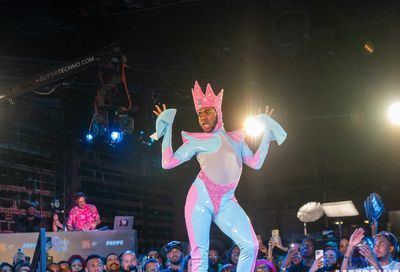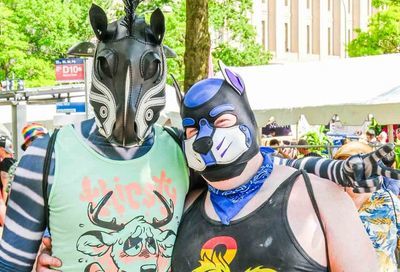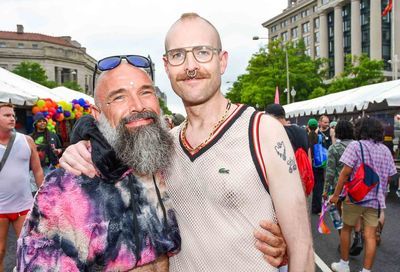Forum: The true power of Black Panther lies in its women
The African-American women in Black Panther, finally, at long last, utterly obliterate the Hollywood construct.

Like a massive line of superbly-built battleships, the Marvel movies one-by-one sail into view, grabbing untold millions as they chug past and then move on to make way for the next in line. They are built for box office war and they have been victors with their lush and lavish formula. No one over the age of 12 has ever expected them to do more than thoroughly entertain, toy with a bit of edgy humor and, eventually allow Pepper — still teetering on her three-inch heels — to lean in.
Then came Ryan Coogler’s Black Panther.
Powering in from some other, far sleeker and more intelligent Universe, one that makes the Marvel standards look almost gauche by comparison, this is the superhero movie no one ever expected. It may look like its kin, with its massive budget and cutting-edge CGI, but it does what no Marvel movie has ever done before: utterly and completely transcend the genre.
To simply state that Black Panther — which vaulted over already high box-office expectations to become the fifth largest movie opening in history — is groundbreaking for African-American audiences is an understatement. It is, in fact, a visionary trifecta for everyone, disintegrating in two and a half hours decades of how we have come to view not just African-Americans, but women and power through film.
To watch Black Panther is to realize — or, perhaps, remember — that there has always been another reality, that there has never been anything inevitable about the neverending avalanche of negative, condescending, and pandering images of blacks in film today. There is no absolute truth that black men in a blockbuster must always fall into one of three archetypes: the “gangsta”; the holier-than-thou truth-sayer; or the angel of righteous retribution.
The image and portrayal of a black man can and, indeed, has been something completely, categorically, different. It pays to remember the days when the nation was still listening to Love Train by the O’Jays, and screens saw the likes of Sidney Poitier, Fred Williamson, Thalmus Rasulala and, of course, Richard Roundtree. The times were far from perfect and racism was ever-present, but the zeitgeist nevertheless allowed for a black identity on film that was, in some ways, far freer and bolder than what passes for characterizations today.
Black Panther, of course, is not trying for straight drama. It is a joyously fun and imaginative rendering of the comic-book tale of the noble, modern king T’Challa — aka the Black Panther — routing evil and keeping his kingdom safe. But in Coogler’s telling, the focus is unerringly on who these people are and what they are made of. It is risky territory for an action-film because the buzzy buttons must be pushed and the pace must be pounding for a common denominator audience of restless teens. But this is where Coogler goes bold.
T’Challa is an antithesis. An essay in understatement, Chadwick Boseman plays this almost-reluctant king from a deep, inner space. He is man seen through searching, expressive eyes, not a formula, and treated to long, languorous takes (by Marvel standards). The pay-off is a powerful sense of a dimensional, authentic personality, the kind that defies cinematic stereotypes — at least in a blockbuster.
Coogler does not stop with T’Challa. Every male character in the film feels as though they have been taken out and shaken free of every image and every association of what it means to be African-American in a major film. Erik Killmonger, T’Challa’s abandoned nephew, is case in point. Raised in the deprivations of the inner-city, Killmonger escaped into the military and became an elite soldier. It’s a role that could easily have spun out like the million that came before it, with the same old swagger and bitterness, the same old bundle of gestures, sneers, and brutality. Instead, Coogler and Michael B. Jordan give Killmonger a fresh and original identity, playing it open, not closed. His almost-resigned expression tells the story of a survivor whose pain has ossified into a drive to possess and control, even if he knows it won’t change a thing. It’s a subtle, carefully played vulnerability that gives his final act on the mountainside a rare and delicately drawn pathos. And it’s a sensibility that makes the usual Marvel angst look cartoonish by comparison.
Coogler’s treatment of his male characters alone would have been enough, but it doesn’t stop there. The African-American women in Black Panther, finally, at long last, utterly obliterate the Hollywood construct. For women of color, for women of character of any color, here are the powerful, the swift, the intelligent, the driven, to aspire to. Gone are the mouth-breathing, A-cup, stick-insects with their boyfriend sweaters. Nowhere to be seen are the pouting unzipped pretend-fighters with their swags of Pantene hair and ass shots. Every role here could have been written for a man, and Coogler — in his brilliance — lets his actors play them authentically, not for an audience of teenage boys.

Already a groundbreaker as Michonne in The Walking Dead, Danai Gurira, as General Okoye, delivers yet another extraordinary character, especially for a superhero film. Her Okoye is riveting because, quite simply, she ignores the playbook. For want of a better way to put it, she delivers it gender-irrelevant: utterly invested in thought and action. If there is no denying the magnificence of her physical beauty, it is no more or less emphasized than that of the men here. Indeed, refreshingly, we see far more naked male chest than we do any female skin.
Similarly, as T’Challa’s cheeky younger sister Shuri, Letitia Wright plays her bookish techie light-years removed from the usual bombshell-in-spectacles rendering of a woman with brains in an action movie. Delivered with quiet irony and a low-key but palpable charisma, this is another remarkably drawn female character. Gone in another fell swoop are decades’ worth of demeaning characters.
And finally, there is Coogler’s exploration of what it means to be powerful. Immersed as we are in a world in which anger, insecurity, and intolerance underpins so many voices and bids for leadership — be they national, local, or in our neighborhoods — Black Panther sets yet another, extraordinary precedent. If the magical Wakanda is a sad-sweet dream in the face of the reality of the current struggle and strife of most African countries, the essence of its principles are not. At the heart of Coogler’s film are questions that rise magnificently above the fray: What are the responsibilities of power? And even more importantly, is there another way to lead, one that has zero to do with dominance and everything to do with unity?

If Coogler uses the massive Marvel machine to raise so many bars — African-American men and women in film, our communal consciousness — he also knows how to spin a fun, fast, and furiously spectacular tale. The fights that matter are choreographed for frank and fresh realism, the car chases for death-defying silliness, and the humor — especially in the hilariously grizzled sub-villain Klaw (played with relish by Andy Serkis) — to please a razor-sharp wit. Add the snazzy CGI, the richly colorful and original set design, and Kendrick Lamar’s low-key and complementary soundtrack, and this is rivaling the likes of “Cubby” Broccoli for quality and class.
But if there is one scene that captures Coogler’s sensibility best, it might be the extraordinary interlude in which T’Challa, as part of a coronation ritual, enters a herb-induced trance. Finding himself on a stunningly beautiful African savannah, rich with the deepening colors of sunset, he notices a lone tree. As the sun goes down, he realizes it is full of sleek and darkly-moving panthers. When one drops to the ground and T’Challa recognizes his father, the moment is quiet, rich, full of emotion. These are his ancestors, and they cherish him. There are a million ways Coogler could have played this scene to please his studio, but instead he made it his own, and it endures long after the spectacle ends.
Like so much of Black Panther, it has nothing to prove and everything to say.
Support Metro Weekly’s Journalism
These are challenging times for news organizations. And yet it’s crucial we stay active and provide vital resources and information to both our local readers and the world. So won’t you please take a moment and consider supporting Metro Weekly with a membership? For as little as $5 a month, you can help ensure Metro Weekly magazine and MetroWeekly.com remain free, viable resources as we provide the best, most diverse, culturally-resonant LGBTQ coverage in both the D.C. region and around the world. Memberships come with exclusive perks and discounts, your own personal digital delivery of each week’s magazine (and an archive), access to our Member's Lounge when it launches this fall, and exclusive members-only items like Metro Weekly Membership Mugs and Tote Bags! Check out all our membership levels here and please join us today!


























You must be logged in to post a comment.